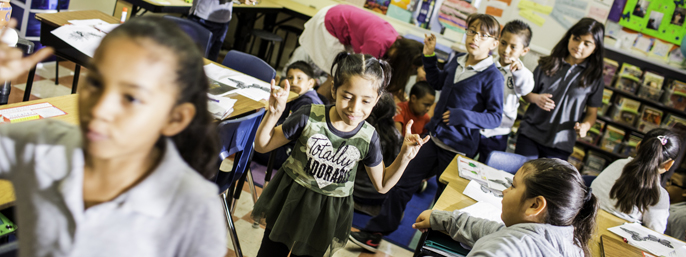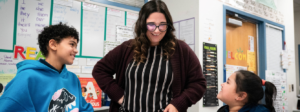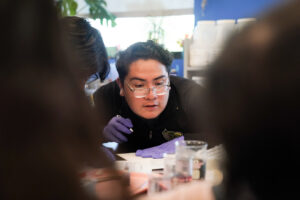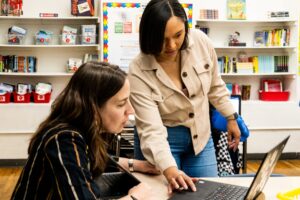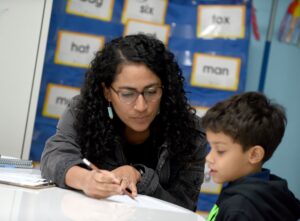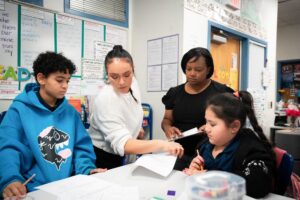As a teacher at Aspire ERES Academy in Oakland, California, I know firsthand how challenging it is to raise standards for students, and to help teachers ensure that students meet those standards. Often what gets lost in this process is properly engaging parents and families to keep them fully informed of the changes occurring in their children’s classrooms.
At ERES, our school leadership team has made great efforts to engage parents in the transition to the Common Core Standards by sending home detailed notices, discussing standards at back-to-school nights and opening our doors for parents with questions. We also encourage parents to volunteer at the school, so parents are very much part of our school community and have access to teachers and school leaders. These steps have helped keep parents informed, but lately, I’ve been asking myself questions about their efficacy. Do parents really understand what I’m talking about when I mention the Common Core? Are they afraid to ask me about it because they don’t know what to ask? To get some answers, I decided to ask them.
I sat down with three ERES parents, Aracely Jimenez, Olga Pelayo and Marcie Watan, all of whom now are a part of our ERES staff. Each parent is passionate about their child’s education—as well as the education of all our students at ERES. Graciously, they accepted the opportunity to speak candidly about their understanding of the Common Core. One thing that emerged in this conversation was that while they’ve seen real changes in their children’s education—and they’re optimistic about these changes—they’re not necessarily connecting those changes to the Common Core, which they’ve heard about as a broad concept.
After speaking with them, it’s clear to me there is indeed more we must do as a school, and probably in schools across the nation, to be open and transparent about what the Common Core means in terms of classroom instruction. When parents hear “Common Core,” they should have a clear picture in their minds of what their child’s learning experience will entail. It is my hope that by sharing these parents’ perspectives, we can begin the process of reaching that goal.
***
First off, I’d love to hear how each of you has become involved in the school community at ERES Academy over the years.
Olga Pelayo: ERES encourages parents to serve 30 volunteer hours each year and attend a number of events like Student of the Month awards, potlucks and showcases that give our kids a chance to show off all that they learn. When my son first entered kindergarten, I did things like help teachers organize fundraisers and bake sales for field trips. Eventually, I started coming into the classroom and actually working with students.
Marcie Watan: I would come in and read with students, which is a nice opportunity to be inside the classroom and see what is happening on a day-to-day basis.
Aracely Jimenez: I am a regular attendee at school events and activities. I love these opportunities because they allow me to get closer to my son and his teacher.
This year, ERES Academy, like many schools across the country, has been transitioning to higher academic standards. I’m curious if you’ve noticed any differences in your child’s school work or experience at school this year, since we made these changes?
MW: Oh yes, definitely—particularly in math. He is solving problems I used to attempt in high school. Sometimes I look at his work and think, “Oh my goodness,” in amazement. He is a much better critical thinker now and I’ve also noticed that he is doing a lot more reading and writing—which is good! But what I think is probably most important is that he is beginning to develop his own strategies for solving problems. Sometimes, I’m the one learning from him.
AJ: I’ve seen a lot of improvements, too. The biggest one is that he used to really struggle in math last year, and I would try to help him when I could. Sometimes it was hard because I am from Nicaragua and the way I learned to solve problems is very different from here. But this year, he hasn’t needed my help as much.
OP: This year, my second grader is really excited about math, which I’m just so happy to hear. He does this thing with his fingers to find the answer of multiplication problems and I look at him and think, “Wait a minute, I don’t know that way.” Often, if we try to solve a problem together, he will get to the answer faster than I do. I say to him, “You need to teach me that!”
So when you hear “Common Core Standards,” how would you describe them? And what do they mean to you?
MW: I hear about the Common Core a lot. But I don’t have any knowledge other than it is something big to do with education.
OP: I know the Common Core has to do with reading and math standards, but honestly, I don’t really have a lot of knowledge about it.
AJ: I agree. I don’t really know enough about it either, honestly.
In addition to Back to School night, notices home and some of our other initiatives, what do you think we could do as a staff that would make you more knowledgeable about the Common Core itself?
OP: I think more communication that explains what the Common Core is, exactly what it looks like in the classroom and how it helps our children. But also, there is a cultural aspect to focus on. Like a lot of parents, I hear the words—and see it in the papers—but there really isn’t a Spanish word for it. I know that for a lot of parents here, myself included, English isn’t our first language and so when we hear something like “Common Core Standards,” we kind of ask ourselves, “Well, what is that? How does it translate?”
As a parent, why do you think it is important to be informed about the Common Core?
OP: I think it’s important because ERES has changed its report card this year as a result of the Common Core and many parents are confused about how their children are being graded. I want to understand the Common Core so I know how my child is performing in school.
AJ: I want to know about the Common Core so I can help my kids with their schoolwork. Sometimes they get stuck and frustrated with learning new things, but I can’t help them. They are learning new ways to do math. I was never taught these ways in Nicaragua. I really want to know about the Common Core so I can help my kids be successful with their schoolwork.
MW: It’s important to know about the Common Core so we, as parents, can understand what is happening in our kid’s classrooms. Personally, I want to know more about the math concepts. I also see my son writing more in every subject, which is great, but I want to know why. I think it’s hard for parents to understand exactly what the Common Core is just by hearing about it. We all need to come into the classroom as often as we can and see it in action.
Why is it so important for you to be involved? How does it help you learn about what’s happening inside your child’s classroom?
OP: It’s very important to see how my son behaves in school, to see what he is doing and how he is responding to it. It’s also important for me to look at his teacher and think about what kinds of strategies he or she is using. He is in school and learning so many things every day. By looking closely at what he is learning, I have the chance to help him—and learn some things, too!
Parents and teachers, we would like to hear what you think. Parents, do you feel that you know enough about the new standards? Teachers, what kinds of strategies do you use to engage parents in the classroom and communicate big changes? Please share your thoughts using the reply form below.
